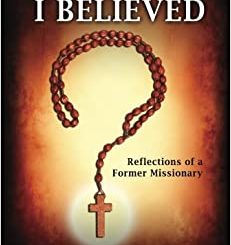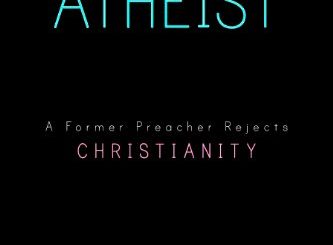Why I Believed 04 – The Crises that Precipitate Losing Faith: Evolution
This post is part of a series.
In the previous post, I discussed author Kenneth Daniels’ high level reasons for leaving the faith. In Chapter 2, he tells his personal story, from believer to atheist, via a few stages.
At a high level, I notice some interesting features of his journey which many of us experience, including:
- A pattern of crisis followed by a recovery of faith, often after reading a book by an intellectual with a less rigid version of faith
- Successive crises that show that the doubt is deeper than we thought
- Reading of books by former Christians who are now atheists, and often antagonistic to the faith
Let’s examine Ken’s crises, his partial resolutions, and our own response to crises of faith. The point, again, is to learn that we have companions on the journey, and are not alone. Some leave the faith for good, some do not, but all find a deeper level of personal integrity and peace. No matter how imperfect our end state is, it is better than where we are now!
Crisis 1: Young Earth Creationism
Keven felt the pressure of scientific consensus, not only in support of evolution, but in support of an old universe. However, old earth creationism came to the rescue, and for a while, stemmed his doubt in creationism. He believes this shift helped him interpret the Bible less literally, and understand it more in it’s cultural and historical context. He also made it clear that the evidence for evolution weakened his faith, not only in his brand of Christianity, but in the scriptures themselves. Though he became open to reading Genesis less woodenly, he ended up relegating the whole story to myth due to his belief in evolution.
My Experience with Evolution
In my senior year as a Biochemistry major in college, I became a Christian. When I then met Christians who doubted evolution, I thought them a little daft. But to humor them, I read their books on creationism, and was surprised.
I was surprised at the level of scientific acumen of some of the authors. I was surprised that, as a life science major, I was never taught that even within the scientific community there was serious discussion about the deficiencies of evolution, so much that there were even competing theories, such as gradualism, punctuated equilibrium, and even panspermia.

I was surprised and insulted that I had never been taught how to think critically about origins research, about the differences between a hypothesis, theory, and philosophy of science. And while I still saw some evidential support for evolution, I was shocked and dismayed at how many holes in the data and the logic were present in this system that was, I was told, ”as sure as gravity.”
For me, ideas such as the information content of DNA, fossils that defied evolutionary classification, the failure of ideas like junk DNA and vestigial organs, were holes big enough to drive a truck through. They acted like sands in the gears of my belief in evolution, and along with my newfound inner experience of transformation, I felt entirely justified in doubting evolution, and in believing in creationism. Even young earth creationism has a good point that geological age is calculated in a circular manner, and Carbon 14 dating depends no some big assumptions that may be wrong.[ref]13 Misconceptions About Evolution (wholereason.com)[/ref] [ref]Scientists Repeatedly Surprised: Do we keep revising evolutionary theory, or finally REJECT it? (wholereason.com)[/ref] [ref]Mass Delusion – 10 Reasons Why the Majority of Scientists Believe in Evolution (wholereason.com)[/ref]
Also, there are many counter indications regarding an old universe, not least of which is the accelerating expansion of the universe, for which scientists won’t consider that the we are just that much nearer to the Big Bang than they thought. Instead, they have concocted out of whole cloth the idea of dark energy and matter driving the universe apart.
So for me as a skeptical scientist coming TO faith, even when I left the faith, I never stopped believing that the universe was created by an intelligence, it was just too obvious to me, whether or not Christianity was true. While some consider teaching of creationism a barrier to faith, I would say that not teaching it could also be considered allowing the evolutionary barrier to go unchallenged. [ref]Is Creationism a Barrier to Faith? (Wholereason.com)[/ref]
I have to say that old earth creationism does not appeal to me, and is not needed if you care to doubt the consensus. There are times to legitimately do that, and times not to.[ref]When to Doubt a Scientific Consensus (wholereason.com)[/ref]
In my journey, books like Lubenow’s Bones of Contention, Wells’ Icons of Evolution, Denton’s Evolution: A Theory in Crisis,[ref]Denton has updated his original book with Evolution: Still a Theory in Crisis (2016)[/ref] and the Morris’ foundational The Biblical Basis for Modern Science shored up my faith, and I actually kept my creationists beliefs even while away from faith, as strange as that seems. I think it was because my beliefs in that area were evidentially-based, not biblically-based.
CONCLUSION
Any potential or perceived conflict between faith and science will certainly cause conflict in an honest believer, but how we resolve this conflict can vary. Some demonize one side or the other, failing to acknowledge weaknesses in the side they choose to believe. Others honestly evaluate the data and make a decision.
With regards to origins research, there is so much room for assumptions about the distant past, that historical data can be inconclusive, sparse, or easily misunderstood. With respect to origins, empirical data is hard to come by, and with respect to evolution, it may actually undermine evolution – as in the example of junk DNA or how genetic trees are disassembling previous evolutionary trees based on phylogeny. But there are more significant crises of faith to examine ahead.[ref]How molecular biology has ‘annihilated the tree of life’ (wholereason.com)[/ref] [ref]Evolutionary Trees – In Flux or Broken and Bogus? (wholereason.com)[/ref]




